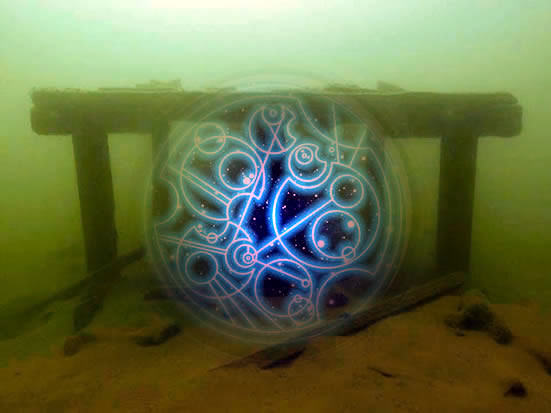

A steward in a smart white and blue uniform brought Marion a long, cool drink with fruit and a colourful paper umbrella in it. Her two female companions were also served drinks.
Marisole, known to her adoring film fans as Madonna Della Rio, was paying for the sleek yacht currently anchored in the middle of Lago Paranoá, the lovely artificial lake that was built beside Brasília, the administrative capital of Brazil. The men in the smart uniforms saluted her especially sharply since she would decide the size of their bonuses at the end of the weekend.
Claudia-Jean, the charming Haolstromnian socialite, was in female form for the duration of this trip to Earth. Swapping genders was socially disturbing here. Besides, as she said, it was an opportunity to wear bikinis by day and fabulous gowns by night.
Marion was wearing a bikini, too, but not quite such a tiny one as either Marisole or Claudia-Jean chose and when she rose from her deckchair to lean on the rail and look across at the city built in the late nineteen- fifties to the modernist vision of Oscar Niemeyer, she put a silk wrap around her waist. Something about bikinis brought out a little of the self-consciousness that Kristoph had long ago taught her to overcome in other clothes.
She looked down into the blue-green water. The men of the party were scuba diving on the lake bed, though there had been no sign of them for the past half hour.
“Strange to think that there is a village sunk beneath the surface,” she said. “I know it’s not the only one, of course. There is one in Derbyshire where they made a reservoir. But I’ve never seen that one. Actually looking down on the place where a whole village was sunk is amazing.”
“Vila Amauri is a little different to your village of Derwent, drowned under the beautifully named Ladybower Water,” Marisole pointed out. “There, a long established community were made to leave their school and church and their little post office and homes they loved. Vila Amauri was a shanty town for the workers building the new capital city. When the job was done the candangos and their families moved on.”
Marion tried to disguise her expression, but Marisole caught it all the same and laughed.
“Yes, I know, a woman who makes her living wearing period costumes which barely contain her heaving bosom isn’t supposed to know such things. But there is always a lot of time between takes and I like to read about other countries. Despite my illustrious career I have never been outside Brazil.”
“Not even for ‘Isabella of Porto’?” Marion asked, feeling a bit ashamed of her assumptions about her friend and glad she had changed the subject.
“ESPECIALLY not for Isabella of Porto,” Marisole replied. “Don’t worry, I have no illusions about the Brazilian film industry. A trim waist and a heaving bosom have made me a lot of money. My OWN money, for which I am not answerable to any man.”
Since they last met at the premiere of one of those bosom heaving films, Marisole had disposed of her perennially-cheating husband and married a new man who had, so far, proved more faithful. He was the one who had suggested diving in the lake as an afternoon activity for the men. The women had all declared it to be far too much work and opted for colourful drinks on the deck.
“I must not get too tired, anyway,” Marisole pointed out. “The film festival tonight will be hard work.” She laughed at herself. “Not as hard as washing other people’s clothes like my mother did all her life, of course, but it IS oddly tiring being seen in a huge reception by all the right people.”
Marion and Claudia-Jean both understood perfectly. They both had plenty of experience of looking cool and unruffled at diplomatic balls while perspiring under their silk gowns and hating the shoes they had to stand up in.
“At least we get to sit down for the film,” Claudia-Jean offered as a crumb of consolation.
“YOU at least have the option of sleeping through it,” Marisole suggested. “I have to look interested all the time in case a photographer sees me.”
“You don’t like your own film?” Claudia-Jean asked her.
“It is better than most,” she admitted. “But the more of it we recorded, the less I thought that Shakespeare’s Midsummer Night’s Dream should have been transposed to mid-nineteenth century Rio de Janeiro.”
“Perhaps it won’t be so bad as that,” Marion assured her.
“Well, it cannot be as bad as ‘Lula, Son of Brazil’,” Marisole admitted, referring to one of the most expensive flops of the Brazilian film industry. Her friends had never seen that film, but they had heard of its reputation and laughed with her.
They were still laughing about everything and nothing when the men returned from their dive. Marisole’s new man, Rodrigo Camaro, emerged first, followed by Kristoph and Hillary. Stewards stood by with towels and dressing gowns which the men put on over their swimming trunks before accepting deckchair and long colourful drinks – though in deference to their masculinity, the fruit and umbrellas were omitted.
“Did you enjoy the dive?” Marion asked her husband.
“Very much,” Kristoph answered. “Of course it is not very deep, but that means there is some natural light on the lake bed. A bit murky, but not like a deep sea dive into blackness. It is rather eerie, though, swimming between what used to be house walls, among what used to be little gardens.”
“The strangest part was an old well,” Hillary added. “It looked deep, dug down to give the worker fresh, clean water from the water table and now flooded like everything else.”
“Many people doubted that the lake would fill when it was proposed,” Marisole told them. “It was thought that the soil was too loose and porous. When it was done, the engineer who had overseen it sent a telegram to one of the doubters simply saying ‘it filled’.”
“A triumph of optimism,” Kristoph observed.
“A triumph of structural engineering,” said Rodrigo with the pride of a man who, unlike Marisole’s previous husbands who were both actors, was, himself, an accomplished architect.
“Either way, well done, that man,” Kristoph conceded.
As Rodrigo explained in more technical detail why he would have sided with the optimists when the lake was created, Marion stretched in her deckchair, her face shaded by a wide-brimmed hat and the rest of her body protected by high factor sunscreen. She let the cheerful conversation wash over her and drowsed, knowing that she needed an afternoon nap if she was going to have to stand up in heels for most of the evening.
She felt the touch of Kristoph’s mind on hers as she drifted between sleeping and awake. She was surprised to find the images in her mind turning a translucent green with a stab of golden yellow glittering through it.
He was sharing with her his memory of diving in Lago Paranoá. First it was very bright, with the sun penetrating the surface, but as they dived down through the water it got a little darker.
But out of the gloom shapes appeared. She found herself looking at stone walls, here and there broken, a stone fallen out of place, but mostly intact. Higher walls, with rusted remnants of a corrugated roof and a door swinging on once firm hinges were the remains of little houses. Outside one of the doors was an old tin bath. Marion remembered one of those when she was very young, in the kitchen of the terraced house in Birkenhead. Strange that something abandoned when the workers left and the village was flooded invoked such a pleasant memory for her.
There was the well! When Hillary mentioned it she had imagined the sort of thing found in those English villages described in guide books as ‘picturesque’ – the sort with a little roof over a windlass and bucket. This was a more practical, workaday well. One circle of evenly sized stones marked the edge of what the men would have dug deep for their potable water. The thought of how deep it went, a dark, drowned shaft beneath the lake was a little chilling.
But it was beautiful in a strange, dreamlike way that easily melded into real dreams. For a long while she was lost in the green underwater world, exploring even into one of the larger buildings with a roof still intact. This was, she found, a little church. Through the gloom she could see a statue of the Virgin and Child in a niche and the altar with the tabernacle and a crucifix on the wall above it. Everything was as it should be if the workers were about to come in any moment to pray.
Then the sunlight pushed through the gloom and Marion felt herself surfacing not from a dive into the lake but from her sleep. She blinked and looked up from the deckchair. Kristoph was watching her and smiled warmly before offering her a glass of iced tea.
“Lovely.” She sipped her drink and described her dream to her friends. Everyone agreed that she had perfectly visualised the drowned village that lay below them, except in one detail.
“There was a chapel, of course,” Rodrigo explained. “The Catholic Bishops would not have permitted the city to be built by men with no access to the Holy Mass. But the remains of it are much less interesting than you imagined. It is very dark inside any place where the roof remained, anyway. And there is nothing to see even with a torch. It was deconsecrated, of course, and the statues, the crucifix, the tabernacle, were all removed. Even the altar was taken to be blessed anew in another place.”
Hillary agreed. The remnant of the church was merely a shell like other parts of the village.
“But Marion’s vision of it is wonderful,” Marisole insisted. “The chapel would have had all of those things. In her mind she saw it as it was, as well as how it is. That is wonderful… and a little miraculous.”
“I quite agree,” Claudia-Jean added, and any of the men who might have thought more prosaically about these things were silenced. Marion smiled at the two women. She had been wondering where her vision of the long defunct village church had come from, since the deep recesses of her mind didn’t usually conjure such things. But Marisole and Claudia-Jean knew it didn’t matter where it came from, only that she had envisioned it.
Later, in a designer gown and matching shoes, dripping with diamonds mined on another world but otherwise matching the best on Earth for glittering opulence, Marion sat in the State Room of the luxury yacht, waiting for her friends to be ready. Claudia-Jean was notorious for changing her mind at least twice and Marisole, after all, was an actress getting ready for the premiere of her latest film. Both would be a little time, yet. Hillary and Kristoph in tailored suits were instructing the bar steward on the correct mixing of whiskey sours, something they did not feel he had quite mastered to their satisfaction.
Marion was surprised when Rodrigo approached her.
“Senhora, friend of my beloved, I thought about your vision of the Vila Amauri chapel, and I knew there must be a picture somewhere.”
He showed her a page in a small book he was carrying. It was a very old book from the late nineteen-fifties about the building of the new capital city. Included in the glossy picture pages between the chapters were photographs of the candangos – the migratory labour force who did the hard work while Oscar Niemeyer and Lúcio Costa took the credit. One picture was of the men at worship in their little church.
“It is just as I saw it in my dream,” she said. “But until a few days ago, when we came to Brasília for the first time, I had never even heard of Lake Paranoá, let alone Vila Amauri, and I have never seen that picture. How could it be?”
“A little miracle, as Marisole said,” Rodrigo proposed. Marion wasn’t sure about that, but there was no time to think about it further. Marisole and Claudia-Jean were at last ready, their designer gowns and glittering jewels ready to outshine anyone else at the Film Festival. Rodrigo took his lady by the hand while Kristoph and Hillary followed them up onto the deck, then down the gangway to the stretch limousines waiting to convey them to the prosaically named Cultural Complex of the Republic where the premiere of A Midsummer Night’s Dream set in nineteenth century Brazil was shortly to be the opening event of the National Film Festival.

 |
 |
 |